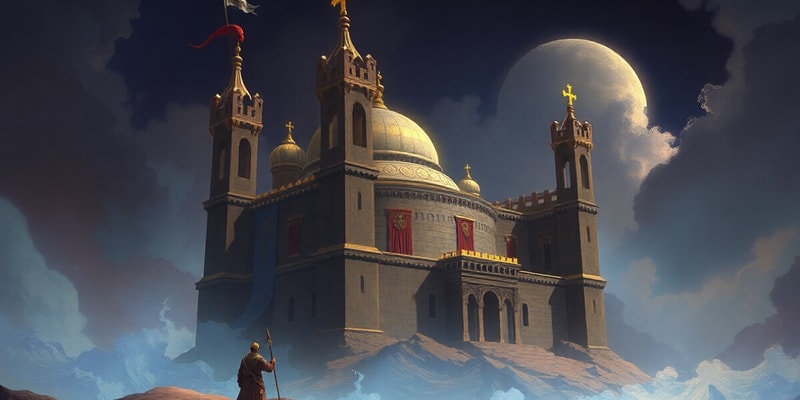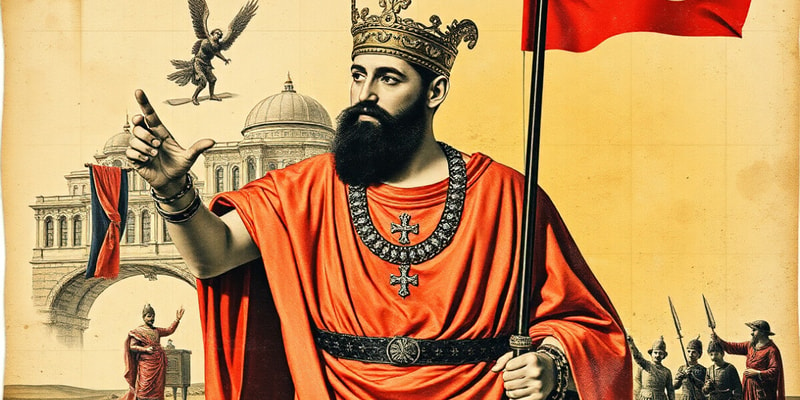Podcast
Questions and Answers
What was the primary purpose of the Justinian Code?
What was the primary purpose of the Justinian Code?
Which city is known as the birthplace of Islam and was significant in Muhammad's early life?
Which city is known as the birthplace of Islam and was significant in Muhammad's early life?
Which of the following is NOT one of The Five Pillars of Islam?
Which of the following is NOT one of The Five Pillars of Islam?
What led to the split between Sunni and Shi’a Muslims?
What led to the split between Sunni and Shi’a Muslims?
Signup and view all the answers
What was the significance of the House of Wisdom in the Islamic Empire?
What was the significance of the House of Wisdom in the Islamic Empire?
Signup and view all the answers
Signup and view all the answers
Study Notes
Byzantine Empire
- Constantine: Emperor who moved the Roman capital to Constantinople.
- Constantinople: The new capital, strategically located for trade and defense.
- Justinian & Theodora: Emperors who oversaw the rebuilding of Constantinople and established Justinian's Code, a significant legal document.
- Nika Revolt/Rebellion: A major rebellion in Constantinople that challenged Justinian's authority.
- Hagia Sophia: A magnificent church, later converted to a mosque, showcasing Byzantine architectural brilliance.
- Justinian Code: A comprehensive legal code that influenced later legal systems.
- Byzantine Empire's Connection to Greco-Roman World: The empire preserved and built upon Greco-Roman traditions in law, philosophy, and art.
- Byzantine Empire's Role in Christian Church Division: The East-West Schism (Great Schism) marked a significant division in Christianity, with the Byzantine Empire adhering to the Eastern Orthodox tradition.
- Similarities to Roman Empire: Shared legal traditions, military organization, and centralized administration.
- Differences from Roman Empire: Shift in capital, emphasis on Eastern traditions, and divergence in religious practices.
Islamic Empire
- Muhammad: Founder of Islam, born in Mecca, a central religious city in Arabia.
- Mecca: Holy city for Islam, central to the Hajj pilgrimage.
- Allah: The one God of Islam.
- Islam/Muslim: Monotheistic religion emphasizing submission to God's will.
- Hijrah: Muhammad's migration from Mecca to Medina.
- The Five Pillars: Fundamental practices of Islam: faith, prayer, charity, fasting, pilgrimage.
- Qur’an: Sacred text of Islam, believed to be the word of God.
- "Rightly Guided" Caliphs: Successors to Muhammad, initially considered ideal leaders.
- Umayyad Caliphate: Early Islamic empire, known for territorial expansion.
- Abbasid Caliphate: Followed Umayyads, shifting the capital to Baghdad & fostering intellectual pursuits.
- House of Wisdom: A major intellectual center in Baghdad, facilitating translation and scholarship.
- Al-Khwarizmi: Scholar at House of Wisdom, known for contributions to algebra and algorithms.
- Ibn Rushd (Averroes): Scholar at House of Wisdom, a leading philosopher and commentator on Aristotle.
- Factors in Spread of Islam: Military conquests, trade, missionary efforts, and acceptance of existing belief systems.
- Treatment of Christians & Jews: Initially, tolerance and coexistence; however, policies varied with time and local circumstances.
- Sunni and Shia Split: Disagreement over the succession to Muhammad's leadership.
- Major Cities of Islamic Empire: Mecca, Medina, Baghdad, Damascus, Cordoba.
- Factors Facilitating Trade: Standardized weights and measures, established trade routes, and a shared common language.
Social Classes of the Islamic Empire
- Merchants, artisans, and farmers constituted the majority of the population.
- Ruling class and nobles comprised a separate hierarchy
Women in the Islamic Empire
- Islam emphasized the rights and responsibilities of women, offering them protections and rights in property ownership, inheritance, and divorce.
- Social customs varied throughout different periods, but many women enjoyed education and autonomy.
Monotheistic Religions (General)
-
Founder and other significant leaders: Vary by religion, e.g., Moses, Abraham, Jesus (Christianity), and Muhammad (Islam).
-
Important cities/locations: Mecca (Islam), Jerusalem (Judaism, Christianity, Islam), Vatican City (Catholicism).
-
Major religious writings: Torah (Judaism), Bible (Christianity), Qur’an (Islam).
-
Major branches/sections and significant differences: Christianity (Catholic, Protestant, Orthodox), Judaism (Orthodox, Conservative, Reform), Islam (Sunni, Shia).
Studying That Suits You
Use AI to generate personalized quizzes and flashcards to suit your learning preferences.
Description
This quiz explores key aspects of the Byzantine Empire, including its capital Constantinople, significant emperors like Justinian and Theodora, and important events such as the Nika Revolt. Discover the empire's legal contributions through Justinian's Code and its role in the Christian Church division.



